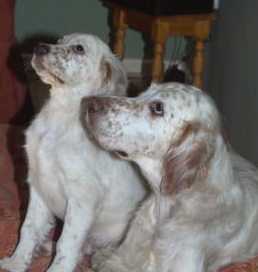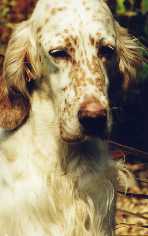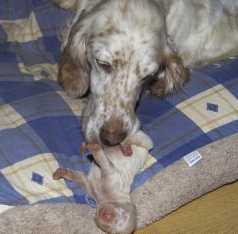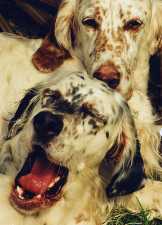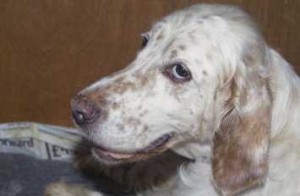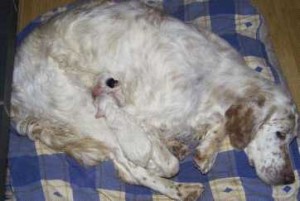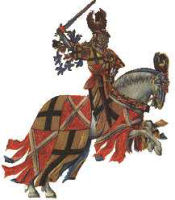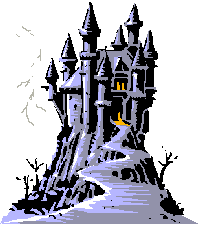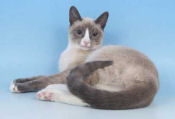Poppy was 10 months old when she came to us –a beautiful orange belton English Setter, she wasn’t ‘suitable’ for showing, but we fell in love with her, and as a pet she became ‘perfection personified’. A gentle, elegant and feminine bitch, she had a litter at two and a half and produced 6 healthy puppies. At five she was in her prime, well bodied and with a good coat. She looked a picture, and we did show her, and she won several ‘Best in Show’s’ at Companion Dog Shows ‘A Local Dog for Local People’ my partner, Steve, called her.
At about this time, I was able to stop watching her weight as she seemed to start regulating it herself, and even had to supplement her food to maintain it. I wasn’t worried, she still looked good. Coupled with this was the occasional bout of colitis which seemed related to times of stress and soon cleared up. Likewise, when she had her second litter in July 2003 at age six and a half, we were disappointed that she only had two puppies and had to have a caesarean. We put it down to her age and poorer fertility, and the caesarean because the puppies could have been quite big as there were only two. However, the puppies were normal sized and healthy and we thought no more about it.
George from this litter stayed with us for a few months waiting for his new home and when he left, there was major disruption in the household. Our youngest bitch, Delyth had suddenly lost her playmate and them promptly came into season for the first time. This caused quite a bit of conflict with her mother – Thalice who would like to think she is top dog and they both became rather a nuisance really. All this upset poor Poppy and she had a very serious bout of haemorrhagic colitis and I found her in a state of collapse when I got home after a night shift. After intensive treatment she started to recover, but never seemed particularly well again. She then unexpectedly came into season a few days later, far too early to be normal, but during this season she did not attract the attentions of her two sons, Fleet and Flash which was again rather strange.
Poppy at 10 months
At the same time all this was happening, she was suffering from a persistent ear infection which was extremely difficult to treat, but we eventually managed to resolve this. She then had a second bout of haemorrhagic colitis 3 months later, in February 2004, not quite as bad this time but even with careful feeding, she never seemed to recover.
She had more blood tests and her tummy shaved for x-rays and scans, but nothing untoward showed up. She had good days and bad days, but was never truly well. Each morning I would check her colour and her mouth would be grey/white and then pick up during the day. Her stomach would sometimes be very tender and ‘burbly’ and then otherwise OK. She seemed depressed and lost her ‘verve’. She became a picky eater and lost weight and muscle tone. Taking her for a walk with the other dogs, she would linger behind and we would get fed up waiting for her. She also started to have that cloying smell of a very old dog in its last days.
Poppy with George
Blood tests were repeated several times only and they came back as slightly abnormal – raised calcium and low protein, but not so far outside normal parameters as to indicate anything seriously wrong. In the mean time, her reluctance to walk, exercise and get into and out of the car was brought home to me when she fell down stairs – not all of them, but enough to frighten us both. Although she has a very low hip score, these symptoms suggested arthritis – so she was treated for that. This showed marginal improvement, but she was gradually losing weight and condition and being lethargic and depressed. Very soon she started to vomit back whatever she ate, her colour was deathly pale and her ear infection returned.
I returned to the vet and awaited a referral to the Royal Edinburgh (Dicks) Veterinary School. In the mean time Poppy was going downhill fast. I was feeding her a chicken ‘slurry’ in an attempt to keep it down, her weigh was down to 19.2 kilos from her normal 25-26 kilos. She appeared very tired and depressed. She was like a ghost, so thin you could see right through her. My wonderful vet got us an emergency appointment at Edinburgh on Thursday 23rd September and I prayed that Poppy would live that long. Two nights before the appointment, Poppy was asleep next to me on the bed and in the middle of the night I reached out and touched her. She was icy cold and had stopped breathing. I didn’t know whether to be upset or grateful, that she had died in her sleep right next to her mum.
However, her chest rose ever so slightly – she was still alive !
Thursday saw the long drive to Edinburgh, and we saw vet Nick Bommer. He thoroughly examined her and asked many questions. I had to sign forms agreeing to euthanasia and post mortem. He told me the problem could be one of three things:
Firstly : Lots of tiny deposits of cancer throughout the digestive system – too small to show up on x-rays or even blood tests – she would have to have an operation to take samples for analysis.
Secondly: A major auto-immune problem
Thirdly: Addisons Disease – not curable, but treatable.
We kissed her goodbye and didn’t really think we would ever see her again – she was so weak she couldn’t even stand up. The vet promised to ring us each evening between 5pm and 6pm each evening to let us know how she was. They duly rang to say she had settled in that evening whilst we were still on our way home.
The next day I was work at lunchtime when my mobile rang. I was horrified – I thought they were going to tell me she had died. They had repeated the original blood tests and the results were worse than previous ones, and just before operating on her they decided to do the Addisons tests, and miraculously these show positive –she had Addisons Disease. I was so relieved – it was the best I could have hoped for.
Addisons disease is a failure of the Adrenal glands which secrete the ‘fight or flight’ hormones. Lack of these hormones mean the body cannot cope with stress – both physical (ie illness) and emotional, plus it allows gains in potassium levels and reductions in sodium levels. The prognosis is good – she will have to take tablets for the rest of her life – I liken it to myself – having to take Thyroxin for the rest of my life – easy peasy !
She is already much better. She hasn’t got arthritis – that was just a red herring, she is bright and lively (and yes – naughty) and putting on weight.
Nick Bommer says that the disease does appear in certain breeds, but English Setters were not known to be one of them, and therefore there is likely to be an inheritance factor. Fortunately Poppy is not the foundation of a great dynasty and her lines will progress no further than her immediate progency.
Poppy was so lucky to get a diagnosis when she did, she would have died that week without treatment. I wonder how many other dogs have had this disease and not been diagnosed ? I hope Poppy’s Story will make other dog owners more aware of this disease and perhaps save another precious life..
THE STORY CONTINUES
Poppy has progressed well and stabilised on her medication. Her shaved patches from the scans and canulas have regrown and she has become bright and cheerful again, put her weight back on and she has started a gentle exercise regime.
I was anxious to avoid what is called an Addisonian Crisis as dogs with this disease are not physically able to cope with stress – either mental or physical and can collapse and die.
So the main worry for an unneutered older bitch would be a Pyometra. For those who don’t already know, this is a serious infection of the uterus and can in itself be fatal. Bitches are very poorly with this and usually need an emergency hysterectomy. It was unlikely that Poppy would survive such an illness couple with emergency surgery. So in discussion with my vet, I decided it would be wise to spay her whilst she was in good health, stable and in a situation where stress could be properly managed.
She was booked in for the operation, which went well except, because she was given extra steroids to manage her condition, she was unable to have painkillers. She was quite poorly at home that evening and her wound was continually bleeding, but not to excess. She was obviously in great pain so I returned her to the vets the next day and we were able to start painkillers whilst the bleeding was stemmed by a large pad and bandage.
Ten days later we returned to have the stitches out and she had healed reasonable well in spite of the high dose of steroids. She appeared well, bright and lively so I asked if she could have her booster. I had discussed this previously with my vet and she had contacted the drug company who had confirmed there were no contra-indications in using the vaccine in Addisonian dogs. Indeed the only other Addisonian dog at the practice has had no problems with the vaccine.
Poppy was a little unwell that evening – she threw back her dinner and appeared a bit subdued. The next morning she was obviously under the weather so I put her in the utility room with access to the outside to give her some peace and quiet. A short while later I could hear her crying. During all the horrendous things she has had to endure in the last two years, she has never cried, she was obviously very poorly. I asked if she wanted to ‘pop out’ and she struggled to her feet and followed me through the house. She stepped out of the patio doors and immediately collapsed. Her mouth was a strong colour and her extremities felt rather cold, and her tummy felt hard. It wasn’t what I expected a crisis would be like and didn’t know if she had eaten something which was causing an obstruction or if it was a case of bloat.
I rushed her to the vets. I had to carry her in and watched her deteriorate on the table. She had a low body temperature, shallow breathing and was drifting into unconsciousness. Her moth was now a vicious purple colour and the vet had great difficulty getting bloods from her. She was wrapped in towels and a space blanket whilst I blew a warm hairdryer inside them.
Her bloods came back well out of normal parameters – this was most likely an Addisonian crisis. She was put on a drip and given steroids and I had to leave her at the vets to go to work.
I later rang the vet from work to check on her, but they were non-commital. I was frantic all through my late shift and although I only got home at 3am the next day, I was up at 8.30 ringing the vets. Better news – she had been out in their garden for a ‘wee’ and was eyeing up the other patients breakfasts although she couldn’t have any herself until they had ruled out any sort of obstruction.. I was back at work later that day, so my partner Steve collected her.
She was put on a raised level of Prednicare and we planned to go back to the vet for more blood tests, but four days later I caught her licking her operation scar and when I checked it she had opened up about two thirds of it and I could see the internal stitches. It was too late to get to the vets that night, so I put a pad on the wound and an old T shirt on Poppy with her tail through the neck, back legs through the arms and the rest gathered up under her chin with a big safety pin !
Back to the vets the following day – they decided to staple the wound without anaesthetic as this was likely to cause the least stress and she lay down and exposed her tummy for them to do this. She was released to me with a collar and some antibiotics. Back to the vets four days later when further staples were required. Her bloods were still abnormal and her medication was adjusted accordingly.
I now know what an Addisonian crisis is like – quite different from the chronic disease I had experienced earlier. The difficulty is going to be recognising the difference between general doggie malaise and the actual collapse which may give me only a couple of hours in which to save her life.
The incident has been reported to the drug company and I am left with the problem of how to deal with an unvaccinated dog who is at as much at risk from the diseases it prevents as she is from the vaccination itself.
STOP PRESS
A year and one minor crisis on from the above, Poppy is fighting fit and so pleased with herself after qualifying for Crufts at the age of nine and a half that she is merrily playing ‘wall of death’ round my living room and wearing out the youngsters with her requests to play !!
The story continues——
This next part doesn’t make pleasant reading – there is no happy ending. For those of you with Addisons dogs please don’t think that early death is the inevitable consequences of the disease.
POPPY – THE END OF THE LINE
It has been nearly six months since Poppy died and since then there has not been a single day I have not wept for her – and for me. I miss her terribly. It’s not that she was an only dog, I have six others, but she was so special. I can still feel her sitting on my knee, I can almost stroke the shape of her ribcage, feel the textures of her coat and draw my fingers over her elegant shapely head.
Poor Poppy had a terrible, terrible time. Addisons Disease in an auto-immune condition which means her immune system was compromised. As a consequence she had a persistent ear infection, which, despite the commitment of myself and my vet refused to clear up and eventually mutated into pseudomonas. I had spent months religiously cleaning her ears twice daily, waiting 20 minutes and then putting eardrops in along with various antibiotic combinations that required chart for me to keep up with them.
But this infection did not respond to any antibiotics and continued to worsen and the worry was that it would infect her whole body thus precipitating an Addisonian crisis which ultimately she could not recover from. We had tried everything else and I knew that what the vet had in mind was her last chance and I didn’t want to lose her for the sake of an ear infection.
There was only one drug left that this infection might be sensitive to – Gentamicin. This drug has horrendous side-effects and can only be given by injection. In spite of this I urged my reluctant vet to consider using this.
So I had to commit myself to two 40 mile round trips to the vet each day with Poppy. I just hoped that the antibiotic would work on the infection before the side-effects took hold and before I collapsed with exhaustion.
After five days there was no obvious improvement and Poppy was unhappy but I couldn’t put my finger on the problem. After 7 days I thought there was some improvement but Poppy was unsteady on her feet and had fallen off the settee for no apparent reason. She has also fallen out of the car trying to get out at the vets. This sort of shock could cause a crisi so I had to be even more careful with her. She has also started standing, swaying with her head down and looking really miserable. She wasn’t eating and had lost weight.
In the mean time I was exhausted working 10 hour shifts, travelling 70 miles to and from work and making 2 trips to the vet each day.
The Gentamicin continued but at one injection per day. Poppy was getting more and more miserable, standing with her legs braced, back dipped, head down and body swaying. She had to be helped in and out to toilet. She couldn’t get in and out of the car and couldn’t get onto the settee without help.
My sister is a Pharmacy Technician and she sent me a copy of Mimms – a publication which describes drugs and their side-effects. Gentamicin causes deafness, dizziness, nausea, hallucinations and major organ failure amongst other things. This was why Poppy was standing like she did.
Back at the vets, I had her electrolyte levels checked and she was about to crash into Addisonian crisis so they admitted her and put her on a drip and steroids.
I knew she would hate being kennelled at the vets even though they have state of the art facilities and 24 hour staffing and I decided that if I visited her she would think she was coming home and get upset when I left, so I decided not to go in and distress her, but sent in minced chicken and pasta for her to eat. They decided to stop the Gentamicin and the ear infection returned. However, after a couple of days, I had to see her. She was carried in by one of the technicians. She was pleased to see me and waved her tail. I was allowed to take her for a ‘walk’ – she could barely stand. However she seemed to enjoy my company, being stroked and being outside on the grass.
They were doing regular blood tests and I was told that her liver and kidneys were failing. They believed the pseudomonas had become systemic although I also suspect that this was an irreversible side-effect of the drug.
They called me the next day at work asking me to come in as they thought her time had come. A doggy friend who I work with came with me.
I went there prepared for the worst and waited in the consulting room. Then I heard her unsteady footsteps walking towards me and her sad little face appeared in the doorway looking at me, her tail waving. I couldn’t do it. She did not respond to any noises and I believe she had gone deaf. She must have felt abandoned, isolated, ill and in pain – she may also have suffered from hallucinations. I went back later that night to cuddle and pet her and the dreadful look she gave me as I left her in the kennel decided me I would take her home to die.
I didn’t want her last memories to be her time in the vets. Her bloods were done again and she liver and kidney failure. She came home to sleep on my settee during the day and my bed at night. She had to be carried in and out to toilet, but although she wandered to the gate to watch the world go by, she ate nothing and drank only a little electrolyte.
A couple of days later I rang the vet first thing in the morning and arranged for her to come out in the late afternoon. I sat with Poppy who was in a deep sleep in a pile of soft duvets – she looked so poorly. I went out the back to let the other dogs out and heard a crash from the living room – I dashed through – Poppy had tried to get off her duvets because I has disappeared and had crashed to the floor. I gently picked her up and took her to the front garden. She staggered round and had a ‘wee’ and went to look through the gate with her tail gently waving.
This exhausted her and I put her, wrapped in a duvet on the settee and cuddled up to her for a while. Eventually, the other dogs had to go out again and whilst I was doing that, she tried to get off the settee and fell in a heap on the floor. I rescued her again.
The vet came in the late afternoon and Poppy greeted her with a wagging tail. I kissed her and said goodbye and cried and cried as she slipped away. I still don’t know if this was the right time or the right thing. She had been so determined to get up and be with me, to go out for a ‘wee’ and to watch the world go by through the gate. It was the hardest decision I have ever made. I have to cling to the words I heard a few weeks late – ‘Better a week to soon than a day too late’- when we take on the responsibility of another life we owe them that courtesy.
My immediate reaction was to mate one of Poppy’s sons – Fleet to my bitch Delyth in the hope that I could get myself another Poppy. However, the reason for not doing this originally was because I had discovered that Poppy’s sire had been in a litter that contained deaf puppies. I had not discovered this until she was in whelp with her first litter – her breeder didn’t tell me. Poppy had been BAER (hearing) tested as normal.
I eventually decided that in spite of my need to replicate Poppy, this still stood as sound husbandry and also, that, as Addisons Disease is believed to be inherited, I couldn’t possibly risk the pain and suffering it brought to us being passed on to another dog and its owner.
Now Fleet has been castrated and his brother Flash will be too. All other puppies born to Poppy have already been neutered, so this is the end of her line.

